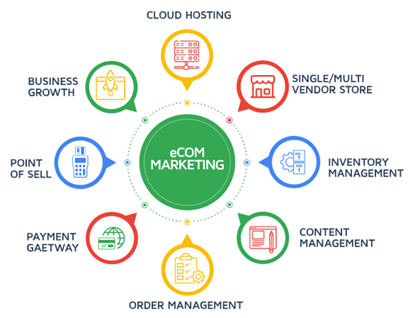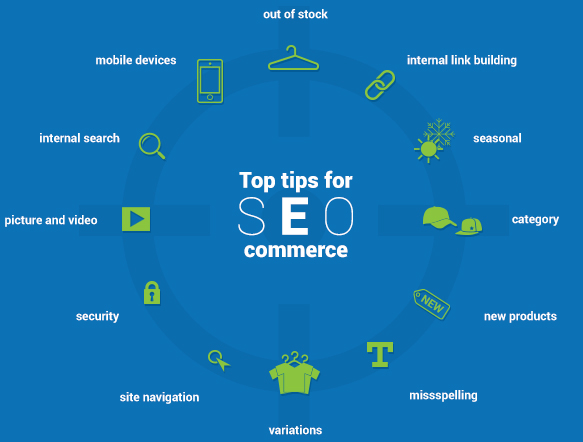Content
SHARE

In today’s digitally-driven world, having a robust online presence is crucial for the success of any eCommerce business.
One of the most potent ways to improve your online visibility and attract potential customers is through SEO or search engine optimisation.
Understanding the importance of SEO in eCommerce is essential if you want to maximise your results and stay ahead of your competition.
Understanding The Importance of SEO In eCommerce
In the vast sea of eCommerce websites, being discovered by your target audience can be like finding a needle in a haystack.
[thrive_leads id=’8325′]
This is where SEO comes into play. By optimising your website, you can improve your search engine rankings and increase your organic traffic.
In other words, SEO helps potential customers find you when they search for your products or services.
But SEO is about more than just attracting visitors to your website. It’s also about creating a seamless user experience and building trust with your audience.
When your website appears on the first page of search engine results, it signals to users that you are a credible and reliable source.
This can significantly impact your online business growth.
Did you know that SEO has been around for more than two decades? It all started in the mid-1990s when search engines like Yahoo! and AltaVista were gaining popularity.
Website owners quickly realised the importance of optimising their websites to improve rankings and visibility.
Since then, SEO has evolved and become integral to any successful eCommerce strategy.
 The Role Of SEO In Online Business Growth
The Role Of SEO In Online Business Growth
SEO plays a crucial role in the success of your eCommerce business. Implementing effective SEO strategies can increase your website’s visibility, drive more targeted traffic, and boost your sales.
When potential customers find your website at the top of the search results, they are more likely to click through and make a purchase.
Furthermore, SEO helps you build brand awareness and establish your online presence.
When people continuously come across your website in search results, it creates familiarity and trust. This can lead to repeat business and recommendations, helping you expand your customer base and increase revenue.
Imagine this scenario: you have a fantastic eCommerce website with high-quality products, competitive prices, and excellent customer service.
However, if your website doesn’t appear on the first page of search results, it’s like having a hidden gem that no one knows about.
This is where SEO becomes your secret weapon to unlock the full potential of your online business.
How SEO Impacts Your eCommerce Visibility
The higher your website appears in search engine rankings, the more visible you become to potential customers.
SEO helps optimise various elements of your website to improve its visibility in search engine results pages (SERPs).
One of the primary factors that affect your visibility is your keyword selection.
By conducting thorough keyword research, you can identify the specific words and phrases that your target audience uses when searching for products or services like yours.
Incorporating these keywords into your website content can significantly improve your chances of ranking higher in search results.
But it doesn’t stop there. On-page SEO, such as optimising your meta tags, headings, and image alt tags, is crucial in improving your visibility.
These elements give search engines valuable information about your website, helping them understand its relevance to specific search queries.
Off-page SEO, which involves building high-quality backlinks and establishing your website’s credibility, is another essential aspect of improving your visibility.
When other reputable websites link to your content, it signals to search engines that your website is trustworthy and deserves a higher rank.
Have you ever wondered how search engines determine the order in which websites appear in search results?
It’s a complex algorithm that considers hundreds of factors, including the quality and relevance of the content, the website’s loading speed, and the user experience.
SEO helps you optimise these factors to improve your visibility and increase your chances of reaching the coveted first page.
SEO is a vital component of any successful eCommerce strategy. It helps you attract more visitors to your website, enhances the user experience, and builds trust with your audience.
By implementing effective SEO techniques, you can improve your search engine rankings, increase organic traffic, and drive more sales for your online business.
 Key Elements of Effective eCommerce SEO
Key Elements of Effective eCommerce SEO
Now that we understand the importance of SEO in eCommerce let’s delve into the key elements that can help you maximise your SEO efforts and achieve maximum results.
But before we dive into the details, let’s take a step back and understand why SEO is crucial for eCommerce businesses.
In today’s digital age, where competition is fierce and online shopping is on the rise, having a solid online presence is essential for success. And that’s where SEO comes in.
SEO, or Search Engine Optimization, is optimising your website to rank higher in search engine results pages (SERPs).
By improving your website’s visibility and relevance to search engines, you can attract more organic traffic, increase brand awareness, and ultimately drive more conversions.
Importance Of Keyword Research
Keyword research is the foundation of any successful SEO strategy. By identifying the right keywords, you can optimise your website content to match what your target audience is searching for.
This ensures that your website appears in search results when potential customers are looking specifically for your products or services.
But how do you conduct effective keyword research? Well, it’s not just about randomly picking keywords that seem relevant. It requires a strategic approach.
You need to consider both the search volume and the level of competition for each keyword.
Targeting high-volume keywords with low competition can give you a strategic advantage and increase your chances of ranking higher in search results.
However, it’s essential to strike a balance. You don’t want to target keywords that are too competitive and difficult to rank for, and you want to target keywords with low search volume that will only bring in minor traffic.
The Role Of On-Page SEO
On-page SEO involves optimising various elements on your website to improve its visibility and relevance to search engines.
This includes optimising your meta tags, headings, URL structure, and image alt tags.
By incorporating your target keywords into these elements, you can signal to search engines which topics your website is relevant.
But on-page SEO is not just about keyword optimisation. It’s also about creating a seamless user experience.
Search engines prioritise websites that provide valuable information to users. So, ensure your content is well-structured, easy to read, and optimised for search engines.
One aspect of on-page SEO that often gets overlooked is the importance of page load speed. In today’s fast-paced world, users expect websites to load quickly.
If your website takes too long to load, users will likely abandon it and move on to your competitors. So, optimise your website’s performance to ensure a smooth user experience.
Off-page SEO And Its Impact On eCommerce
Off-page SEO refers to activities conducted outside of your website to improve your search engine rankings. Building high-quality backlinks from reputable websites is one of the most effective off-page SEO strategies.
When other websites link to your content, it signals to search engines that your website is trustworthy and authoritative.
This can improve your website’s visibility and increase your chances of ranking higher in search results.
However, building natural, organic backlinks is essential rather than resorting to unethical practices that could harm your website’s reputation.
Another aspect of off-page SEO that is often overlooked is social media presence. Social media platforms provide an excellent opportunity to engage with your audience, build brand awareness, and generate traffic to your website.
So, consider the power of social media in your SEO efforts.
In conclusion, effective eCommerce SEO requires keyword research, on-page optimisation, and off-page strategies.
By implementing these essential elements, you can maximise your SEO efforts and achieve maximum results for your eCommerce business.
 Implementing SEO Strategies for Your eCommerce Site
Implementing SEO Strategies for Your eCommerce Site
Now that we’ve covered the key elements of effective eCommerce SEO, let’s explore how you can implement these strategies for your online store.
Implementing SEO strategies for your eCommerce site is crucial for driving organic traffic and increasing online visibility.
By optimising your website and its content, you can improve your search engine rankings and attract more potential customers.
Creating An SEO-Friendly Site Structure
A well-organised and user-friendly site structure is essential for search engines and users.
Your website should have clear navigation menus, a logical URL structure, and easily accessible internal links.
This ensures that search engines and visitors can navigate your site easily, resulting in a better user experience and improved SEO performance.
Consider categorising your products into relevant and logical categories when designing your site structure. This will help search engines understand your site’s organisation and make it easier for users to find what they are looking for.
For example, if you have an online clothing store, you can categorise your products into sections such as men’s clothing, women’s clothing, accessories, and shoes.
In addition to categorisation, consider implementing breadcrumb navigation.
Breadcrumbs provide users with a clear path back to the main categories or homepage, making navigating your site easier.
Search engines also appreciate breadcrumbs as they provide additional context and improve the overall crawlability of your website.
Optimising Product Descriptions For SEO
When it comes to eCommerce, your product descriptions play a critical role in attracting potential customers and improving your search engine rankings.
Each product description should be unique, informative, and optimised with relevant keywords.
This helps search engines understand the context and relevance of your products, making it easier for potential customers to find them.
When writing product descriptions, provide detailed information about the product’s features, benefits, and specifications.
Include relevant keywords naturally throughout the description, but avoid keyword stuffing, as it can negatively impact your SEO efforts.
Consider using bullet points or numbered lists to highlight key features or benefits of the product.
This makes the description more scannable for users and helps search engines identify important information about the product.
Additionally, remember to optimise your product images. Use descriptive file names and alt tags that include relevant keywords to improve the visibility of your images in search engine results.
Importance Of Mobile Optimisation In SEO
In today’s mobile-first world, optimising your website for mobile devices is no longer optional – it’s essential.
Mobile optimisation improves the user experience for mobile users and impacts your search engine rankings.
Search engines prioritise mobile-friendly websites, so make sure your eCommerce site is fully responsive and loads quickly on all devices.
When optimising your site for mobile, consider implementing a responsive design. This ensures that your website adapts to different screen sizes and resolutions, providing a seamless experience for users across all devices.
Responsive design eliminates the need for separate mobile and desktop versions of your site, making it easier to manage and maintain.
Another important aspect of mobile optimisation is page speed. Mobile users expect fast-loading websites, and search engines consider page speed when ranking websites.
Optimise your images, minify CSS and JavaScript files, and leverage browser caching to improve your site’s loading time.
Furthermore, ensure your mobile site is easy to navigate with finger-friendly buttons and menus.
Simplify the checkout process for mobile users, as lengthy and complex forms can lead to higher bounce rates.
By prioritising mobile optimisation, you enhance the user experience and increase the chances of converting mobile visitors into customers.
Monitoring And Improving Your eCommerce SEO
Implementing SEO strategies is just the first step. You must regularly monitor and refine your SEO efforts to ensure continuous improvement and maximum results.
Tools For Tracking SEO Performance
Several tools are available to help you track and measure your SEO performance.
Google Analytics and Google Search Console are two powerful tools that provide valuable insights into your website’s organic traffic, keyword rankings, and user behaviour.
By leveraging these tools, you can identify areas for improvement and make data-driven decisions to enhance your SEO strategy.
Regularly Updating and Refining Your SEO Strategy
SEO is an ongoing process. As search engine algorithms evolve and user behaviour changes, staying updated and adapting your SEO strategy is crucial.
Regularly analyse your website’s performance, track keyword rankings, and monitor your competitors.
This will help you identify opportunities and make necessary adjustments to stay ahead of the game.
Dealing With SEO Challenges And Setbacks
SEO can be challenging, especially for eCommerce businesses. Competition is fierce, and search engine algorithms are constantly changing.
Having a proactive mindset and being prepared to tackle challenges is essential. Stay informed about industry trends, seek expert advice, and never stop learning.
With dedication and persistence, you can overcome setbacks and achieve long-term success with your eCommerce SEO efforts.
In conclusion, maximising your eCommerce SEO is crucial for achieving maximum results in today’s competitive online landscape.
By understanding the importance of SEO, implementing effective strategies, and continuously monitoring and improving your efforts, you can increase your website’s visibility, drive targeted traffic, and, ultimately, boost your sales.
Remember, SEO is not a one-time task – it requires ongoing dedication and adaptation to stay ahead of the curve.
Frequently Asked Questions About eCommerce SEO
”Is
Yes, SEO is essential for eCommerce. Correctly implemented SEO increases organic traffic, improves visibility for product pages, and enhances the overall user experience, leading to higher conversions and sales.
”How
- Keyword Research: Identify relevant keywords that potential customers might use to find your products.
- On-Page Optimisation: Use relevant keywords in product titles, descriptions, meta tags, and URLs. Use high-quality images and optimise their alt tags.
- User Experience: Ensure fast loading times, mobile-friendliness, and easy navigation.
- High-Quality Content: Create value-driven content that answers queries related to your products or industry.
- Backlinks: Build authoritative backlinks to your product and category pages.
- Technical SEO: Implement structured data, ensure a secure website (HTTPS), and create an XML sitemap.
”How
eCommerce SEO involves optimising product pages, category pages and dealing with issues like duplicate content from product descriptions. It often requires focusing on transactional keywords and optimising for high-converting search queries. On the other hand, normal SEO might have a broader focus, including informational and navigational queries. It might involve optimising various types of content, such as blog posts, infographics, and videos.
”What
- Ahrefs: For backlink analysis and keyword research.
- SEMrush: For competitive analysis and keyword tracking.
- Moz Pro: For on-page optimisation and keyword suggestions.
- Screaming Frog: For technical SEO audits.
- Google Search Console: For monitoring website performance and errors.
”How
- Competitor Analysis: See which keywords competitors rank for using tools like SEMrush or Ahrefs.
- Google Keyword Planner: Discover keyword ideas related to your products.
- Google Suggest: Type product-related queries in Google and note the autocomplete suggestions.
- Long-Tail Keyword Research: Use tools like Ubersuggest or AnswerThePublic to find longer, more specific queries related to your products.


 The Role Of SEO In Online Business Growth
The Role Of SEO In Online Business Growth Key Elements of Effective eCommerce SEO
Key Elements of Effective eCommerce SEO Implementing SEO Strategies for Your eCommerce Site
Implementing SEO Strategies for Your eCommerce Site









